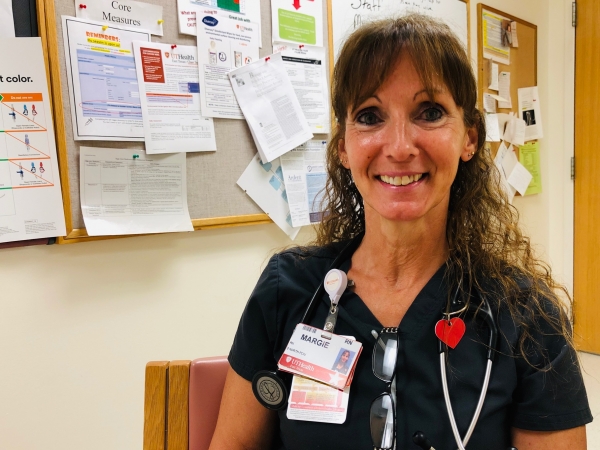
Margie Smith’s introduction to cardiac nursing came when she was a heart patient 25 years ago.
That experience, Smith says, shaped the patient care she now provides as an RN in UT Health Tyler’s Cardiovascular Intensive Care Unit.
“Being a patient has allowed me to be a better nurse,” Smith says. “Had I not gone through what I went through, I’m not sure I’d have pursued nursing.”
Smith first started experiencing heart problems at age 28. By age 32, with four sons younger than 10 at home, she received her first pacemaker.
“I made the decision that nursing is a lot like having children, there’s a nurturing side,” she said. “And after experiencing what I went through, I decided I could make a difference.”
It was during her time in the hospital that Smith saw the difference a nurse could make.
“Patients can tell the moment you walk through that door if you want to be there and if you want to take care of them,” she said. “So depending on how my nurse acted coming through the door, that would decide if I would ask for coffee.”
One nurse in particular made an impact on her life and how she now cares for her own patients. Smith, who describes herself as “touchy and affectionate,” was suffering a severe headache, a side effect from one of her medications, and the nurse took the time to rub her face.
“He was awesome,” she says. “He was the most compassionate and affectionate nurse. When I got into nursing, I always told myself I’m going to try to be just like him.”
Smith enrolled in the nursing program at Tyler Junior College in 2007, when her youngest son was a junior in high school, earning her LVN. She later went back for her RN, graduating in 2017.
She says it was her own health history that led her down the path of nursing, and that history can teach her patients a valuable lesson.
“When we hear a patient has to get a pacemaker, sometimes that’s another setback to them … and they think it’s going to alter their lives,” Smith says. “I get to come in and not only tell them from the standpoint of the textbook, but living with it. I do 12-hour shifts, I’m in my 50s. If anything, it’s given me back my quality of life.”
The best part of her job, Smith says, is the patient interaction and knowing she’s making a difference in their lives.
The advice she now gives to student nurses is something she tries to live out daily.
“You always have an opportunity to make that morning better, because if you come through that door and you bring anything else with you other than a smile, you’ve possibly made their day worse,” Smith says. “You have an opportunity to make the patient’s day better.”
